What is Qi (chi)? Definition of Qi | AMC Acupuncture School Blog | Miami, Florida
In English, qi (also known as chi) is usually translated as “vital life force,” but qi goes beyond that simple translation. According to Classical Chinese Philosophy, qi is the force that makes up and binds together all things in the universe. It is paradoxically, both everything and nothing.
Unless you're enrolled at an acupuncture school, this concept may seem strange and inapplicable to medicine and healing. As such, in this article, we will explore the concept and definition of qi, as it relates to Traditional Chinese Medicine (TCM).
Understanding what Qi is in TCM
In Traditional Chinese Medicine (TCM), the concept of qi or chi has two main branches. There is the physical or nourishing portion of qi that makes up the air, water, and food that we take in. The other branch of chi is more insubstantial. It is the vital fluids and the energy itself that flows through our bodies.
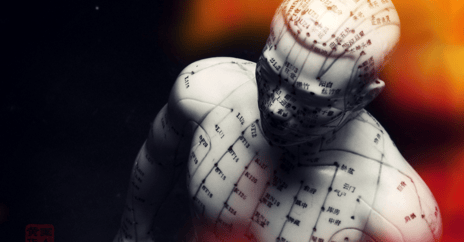
Chi flows along the meridian points of the body and serves the basis for understanding acupuncture.
The first, as stated above, could be thought of as those things we take in and make a part of us while the second is what has already become part of us and is then released to continue the cycle of life. It is the imbalances and interruptions of this flowing force that is responsible for most human ailments whether physical, mental, or emotional.
In this article, we will explore the concept of qi in the human body and how it relates to Oriental Medicine.
Yin and Yang: To truly understand qi it is important to grasp the concept of Yin-Yang. Yin is that portion of qi that is cold, passive, solid, heavy, descending, moist and dark; it is the physical or brute side of the universe. Yang is ethereal. It is nebulous, hot, active, dry, rising and aggressive.
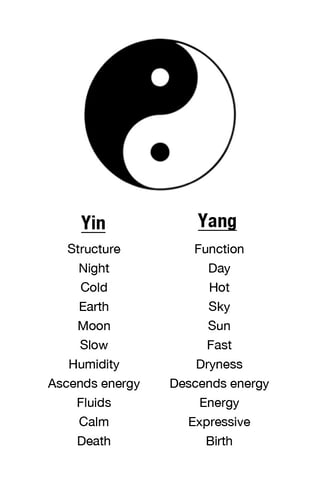
A chart of different yin-yang relationships
It must be understood that yin and yang do not exist outside of each other, but rather, that they reside within each other and must be kept in proper balance.
Form (
Maintaining Balance of Qi
As with yin-yang, qi needs to balance in order to maintain good health. If there is an imbalance of qi, illness can arise, with varying symptoms according to the type of qi and whether there is a deficiency or excess of qi. Curing the imbalance of qi is usually the main work of the different healing modalities in Traditional Chinese Medicine, such as acupuncture and tui na.
Qi Deficiency: In Chinese medicine, a qi deficiency can take many forms. It could be a lack of sleep, food shelter, clean water, fresh air or other physical things the body needs to function properly. It can also be a lack of sufficient mental stimulation, social interaction, and love.
Excess Qi: Excess qi can be as detrimental as a qi deficiency if not worse. It can arise as a result of environmental toxins, like polluted air or water. It can also arise from excessive physical activity, overeating, stress, or strong negative emotions.
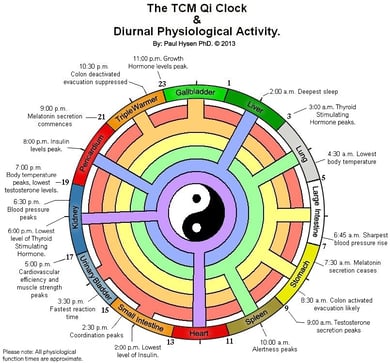
An advanced diagram showing the relationship between qi and the diurnal cycle.
To avoid disharmony it is important to maintain a proper balance of all the different forms of qi that make up life. There are four types of qi within the human body:
- Parental Qi: Our parental or yuan qi is the qi that is inherited from our parents at conception. After conception occurs, parental qi is stored in the kidneys.
- Pectoral Qi: Pectoral or
zong qi is qi that is produced by breathing. It is stored in the chest area. - Nutritional Qi: Nutritional or
ying qi is derived from eating foods and is responsible for the circulation nutrition throughout the body. - Defensive Qi: Defensive or
wei qi is responsible for protecting the body from illnesses. It is the yang of nutritional qi, meaning that it is also derived from eating foods, but serves a different purpose
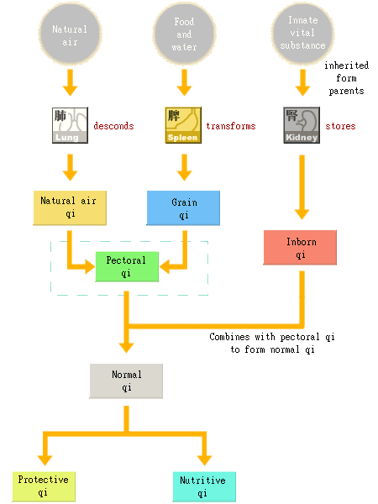
Qi flow chart
Functions of Qi: Each of the vital substances has Five Cardinal Functions: actuation, warming, defense, containment, and transformation. The five cardinal functions of qi are:
- Actuation: Qi is responsible for maintaining the vital life energy that is necessary for the body to grow and develop properly. This includes all the body’s functions, such as the Zang-fu organs, meridians, and Xue (Blood). If there is a qi deficiency, then the functional entities and vital substances will be negatively impacted, which can cause illness.
- Warming: Qi helps produce heat and regulates body temperature for normal functions to occur. A deficiency in qi can result in a lowered body temperature, cold limbs, and a disposition to hot drinks, as means to combat this.
- Defending: Qi defends the body against external elements, such as pathogens and environmental factors that can cause illness.
- Containment: Qi is responsible for ensuring that the body’s organs and fluids kept in their proper places. In the case of
xue , qi is responsible for regulating blood flow within the vessels and ensuring that they don’t leak out. Qi also regulates Jinye (body fluids-sweat, saliva, etc.) and makes sure that only the proper amount is allowed to leave the body. Qi deficiency can result in symptoms related to body fluids and organ problems. - Transformation: Qi is also responsible for transforming nutrition and air into different subsets of qi, such as blood.
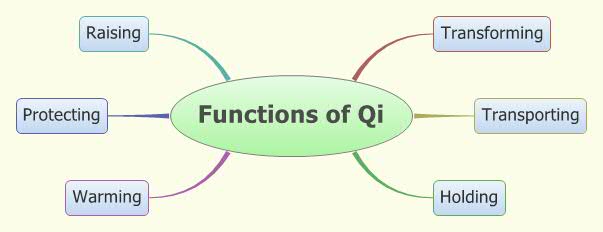
This chart is a summary of the qi functions. This article groups holding and transporting together.
By now, it should be clear how important qi is in the human body. In the following weeks, we will continue the discussion of the philosophy and ideas in Traditional Chinese Medicine. If you're interested in an acupuncture career, please download our free career guide below or visit our acupuncture and oriental medicine program page. Our school is located in Miami, FL.
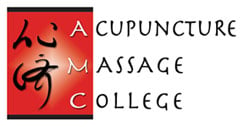
 (305) 595-9500
(305) 595-9500







